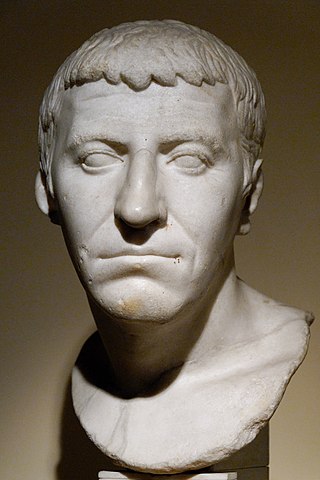
Arria was a woman in ancient Rome. Her husband, Caecina Paetus, was ordered by the emperor Claudius to commit suicide for his part in a rebellion but was not capable of forcing himself to do so. Arria wrenched the dagger from him and stabbed herself, then returned it to her husband, telling him that it didn't hurt. Her story was recorded in the letters of Pliny the Younger, who obtained his information from Arria's granddaughter, Fannia.

Publius Clodius Thrasea Paetus, Roman senator, who lived in the 1st century AD. Notable for his principled opposition to the emperor Nero and his interest in Stoicism, he was the husband of Arria, who was the daughter of A. Caecina Paetus and the elder Arria, father-in-law of Helvidius Priscus, and a friend and relative by marriage of the poet Persius. Thrasea was the most prominent member of the political faction known today as the Stoic Opposition.

Gnaeus Domitius Corbulo was a popular Roman general, brother-in-law of the emperor Caligula and father-in-law of Domitian. The emperor Nero, highly fearful of Corbulo's reputation, ordered him to commit suicide, which the general carried out faithfully, exclaiming "Axios", meaning "I am worthy", and fell on his own sword.
Gnaeus Arrius Antoninus was the maternal grandfather of the Emperor Antoninus Pius.

Gaius Julius Quadratus Bassus was a Roman senator and general. He rose from provincial aristocratic origins to occupy the highest offices of Rome. He served as a legionary commander and as imperial governor of Judea, Cappadoccia, Galatia, Syria and Dacia. He is known to have been active under Trajan in the Dacian and Parthian Wars. Bassus was suffect consul in the nundinium of May to August 105 with Gnaeus Afranius Dexter as his colleague.
Titus Clodius Eprius Marcellus was a Roman senator, twice consul, best known for his prosecution of the Stoic senator Thrasea Paetus and his bitter quarrel with Helvidius Priscus. Eprius was also notorious for his ability to ingratiate himself with the reigning Emperors – especially Nero and Vespasian – and his hostility to any senatorial opposition, but in the last year of Vespasian, in circumstances that remain obscure, he was accused of treason and committed suicide.
The gens Arria was a plebeian family at ancient Rome, which occurs in history beginning in the final century of the Republic, and became quite prominent in imperial times. The first of the gens to achieve prominence was Quintus Arrius, praetor in 72 BC.
The gens Caecinia was a plebeian family of Etruscan origin at ancient Rome. Members of this gens are first mentioned in the time of Cicero, and they remained prominent through the first century of the Empire, before fading into obscurity in the time of the Flavian emperors. A family of this name rose to prominence once more at the beginning of the fifth century.
The gens Caesennia was an Etruscan family from Tarquinii during the late Roman Republic and in imperial times. Two of its members were mentioned by Cicero, and the name is found in sepulchral inscriptions.
Pomponius Bassus was a Roman senator active during the reigns of Septimius Severus, Caracalla, and Geta.
Lucius Nonius Calpurnius Torquatus Asprenas was a Roman senator who achieved the office of consul ordinarius twice, first under Domitian and later under Hadrian.
The gens Laecania or Lecania was a minor plebeian family at ancient Rome. Members of this gens first appear in history during the reign of Tiberius. The first to attain the consulship was Gaius Laecanius Bassus in AD 40.
Gaius Laecanius Bassus Caecina Paetus was a Roman senator of the early Roman Empire, whose known career flourished under the reign of Vespasian. He was suffect consul in the nundinium of November to December AD 70 as the colleague of Lucius Annius Bassus.

Lucius Caesennius Sospes was a Roman senator of the 1st and 2nd centuries AD. Through his mother, Flavia Sabina, a cousin of the Roman emperors Titus and Domitian, his connections enabled him to hold a series of civil and military imperial appointments. He was suffect consul in the nundinium of May to August 114 as the colleague of Gaius Clodius Nummus. Sopses is known primarily from an inscription found in Pisidian Antioch.
Lucius Annius Bassus was a Roman senator of the early Roman Empire, whose known career flourished under the reign of Vespasian. He was suffect consul in the nundinium of November to December AD 70 as the colleague of Gaius Laecanius Bassus Caecina Paetus.
Lucius Nonius Calpurnius Torquatus Asprenas was a Roman senator of the early Roman Empire, who flourished under the reigns of Nero and Vespasian. He was suffect consul around the year 78.
Gaius Laecanius Bassus was a Roman senator, who was active during the Principate. He was consul ordinarius for the year 64 AD with Marcus Licinius Crassus Frugi as his colleague.
Gaius Valerius Paullinus was a Roman senator, who was active during the reign of Trajan. He is best known as a friend of Pliny the Younger, having received a number of letters from Pliny. Paullinus was suffect consul in the nundinium of September to December 107 as the colleague of Gaius Julius Longinus.
Arria was a woman in ancient Rome of a prestigious family notable in political affairs -- though often on the bad side of the emperor -- throughout the first century CE.





